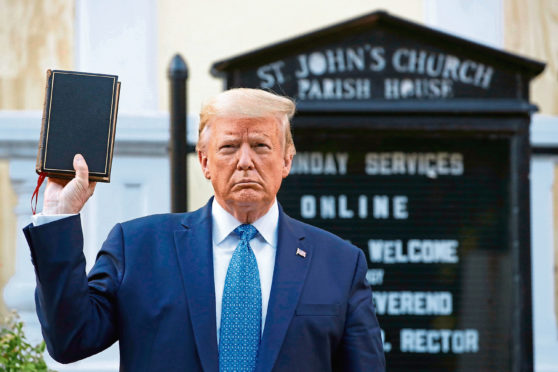There’s the King James version and the Jerusalem version, and the Orthodox Jewish version, and the Quaker version.
And now there’s the Trump version of the Bible: upside down and back to front. Just like him.
The version of a man whose links to Jesus are a little tenuous given his history of abuse of power and his grandiose boasts about sexual prowess.
Though come to think of it, that’s not unlike a few bishops of my acquaintance.
Trump says that fabulous as his own book, The Art of the Deal, is, it comes second to the Bible, which is uncharacteristically modest of him.
Close, obviously, but a surprising comparison given that his knowledge of the good book seems less than intimate. What’s his favourite part? Ooh…that’s personal. Old or New Testament, then? Ehm…both equally.
You don’t need to be religious to become nauseous at the cynical misuse of a sacred text – of any denomination – by a man who raises it while threatening to gun down George Floyd protesters, who considers himself so irresistible to women that he can “grab ‘em” by the – let’s be polite – genitals. (Psst! Donald, it’s the size of your wallet that’s irresistible, and nothing else.)
His cynicism and hypocrisy, of course, are politically focused. One in four Americans are Evangelical Christians and 81% of them voted for Trump.
The country’s right-wing agenda supports the Ku Klux Klan and the League of the South, an organisation that thinks southern culture is threatened by interracial coupling, homosexuality and the acceptance of religions outwith Christianity.
Last December, an investigative newspaper report appeared on police membership of racist groups in the US, and the fact that white supremacists and far right extremists had killed more Americans in the last decade than any other ideology.
In a comment that now seems prophetic, a researcher at America’s Centre for Analysis of the Radical Right said: “We’re seeing the radical right grow in substantial ways and inevitably that is reflected in police forces and security forces more generally.”
After watching a police officer kneel on the neck of a black man until his last breath was forced from his windpipe, the FBI response to that story suddenly felt particularly poignant.
They did not, and would not, police “ideology”. Well, that much we know. For we have been here before.
We were here in 2014, when teenager Michael Brown was shot dead by a police officer in Missouri.
When Eric Garner was choked to death in Staten Island. And in March this year when Breonna Taylor was shot dead as she slept after police officers broke into her apartment on a “no knock” warrant.
So, at what point do the FBI consider that maybe they should police the ideology of their law enforcers?
Two weeks ago, we watched George Floyd die.
Last week, we heard that the review into the death of Darren Cumberbatch, who died in Britain after being punched repeatedly by police, has been delayed for more than a year.
This week, a report highlighted systemic racism within the NHS Blood and Transplant Unit.
The response to all these events? Trump brandishes a Bible. Johnson mutters: “I hear you”. They might as well say: “Go away”.
Sadly, we usually do. Our collective outrage about racism flares up after specific incidents.
Shortly after, the flames are embers. Inevitably, justified anger also gets hijacked by unjustified looting.
But this time, the issue isn’t just disappearing. Nor should it. Not in America and not here.
The police represent all of us. Their knee on someone’s neck shames all of us. This is a systemic problem and our protests can no longer be sporadic.
There is sometimes a misleading glamour in oppression, a Hollywood depiction of slavery and mistreatment that eventually results in the glorious defiance of the subjugated.
In that defiance, there is apparent victory. We cheer and walk on. Until, further down the road, another corpse appears, another chant of “black lives matter”. To those who want to change the slogan to ALL lives matter, well yes of course they do – but those corpses on the sidewalk right now are black.
According to the New York Times, even white people are waking up. Now 71% of white Americans class racism as “a big problem”, up 26% since 2015.
And 57% of Americans acknowledge that police officers are more likely to treat black people unfairly than white people.
Ironic, then, that Trump uses a racist incident for a photo opportunity of him holding a tome that preaches, love, justice and equality. No wonder he held it upside down.
Contrast that with Amazon driver Monica Salinas, who delivered medical supplies to an Idaho family.
A note on the door thanked drivers for maintaining vital supplies to their ill baby during the pandemic.
Salinas bowed her head, said a prayer, made the sign of the cross and left, without realising she had been captured on security cameras.
Just as you don’t need to be religious to be sickened by Trump’s cynicism, nor do you need to be religious to be touched by Salinas’s quiet sincerity.
Politicians, take note. Stop noisy posturing; start authentic action.
